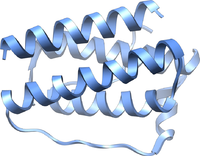
Photo from wikipedia
Estrogen receptor-alpha (ERα) positivity is intimately associated with the development of hormone-dependent breast cancers. A major challenge in the treatment of these cancers is to understand and overcome the mechanisms… Click to show full abstract
Estrogen receptor-alpha (ERα) positivity is intimately associated with the development of hormone-dependent breast cancers. A major challenge in the treatment of these cancers is to understand and overcome the mechanisms of endocrine resistance. Recently, two distinct translation programs using specific transfer RNA (tRNA) repertoires and codon usage frequencies were evidenced during cell proliferation and differentiation. Considering the phenotype switch of cancer cells to more proliferating and less differentiated states, we can speculate that the changes in the tRNA pool and codon usage that likely occur make the ERα coding sequence no longer adapted, impacting translational rate, co-translational folding and the resulting functional properties of the protein. To verify this hypothesis, we generated an ERα synonymous coding sequence whose codon usage was optimized to the frequencies observed in genes expressed specifically in proliferating cells and then investigated the functional properties of the encoded receptor. We demonstrate that such a codon adaptation restores ERα activities to levels observed in differentiated cells, including: i) an enhanced contribution exerted by transactivation function 1 (AF1) in ERα transcriptional activity; ii) enhanced interactions with nuclear receptor corepressor 1 and 2 [NCoR1 and NCoR2 (also known as SMRT), respectively], promoting repressive capability; and iii) reduced interactions with SRC proto-oncogene, non-receptor tyrosine kinase (Src) and phosphoinositide 3-kinase (PI3K) p85 kinases, inhibiting MAPK and AKT signaling pathway.
Journal Title: Molecular oncology
Year Published: 2023
Link to full text (if available)
Share on Social Media: Sign Up to like & get
recommendations!